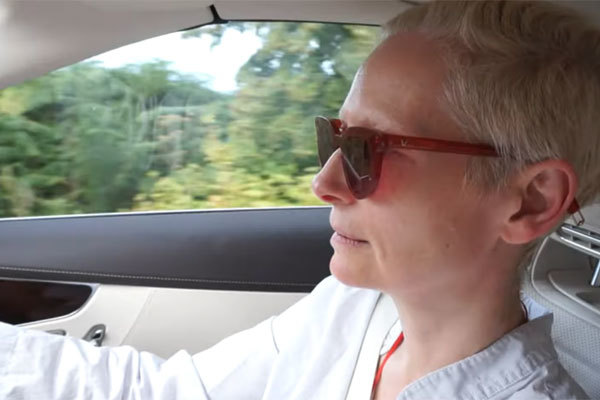- Biographies: A new way of telling the lives of women
Why do the names of Kira Muratova, Malvina Urseanu, Ana Mariscal, Moufida Tlatli, Larisa Shepitko or Kinuyo Tanaka not even appear in the introductions to the most elementary history of cinema? Is your cinema worth less than that of your fellow men? Historian, critic and even polemicist Mark Cousins is not only satisfied with asking the question from a strictly theoretical or political level. Also, one step further, he answers. And he does it with a dazzling 16-hour documentary recently presented at the European Film Festival in Seville. Women make film (a new road movie throughout the history of cinema) is an irrefutable monument that basically proposes a rigorous reading of everything that has been capable of the most innovative of the arts, but from one side until now hidden. And blind.
"You can be sexist by omission . I do not try to denounce my colleagues and accuse them of being unfair or having purposely obviated the filmmakers. I don't think there has been a kind of rational and premeditated sexism, but I do believe that many men identify only with other men and for that reason they leave women aside. And that, consciously or unconsciously, is sexism, "says Cousins himself to make clear what his first motivation might be. And he adds: "I remember attending a retrospective of Polish cinema not so long ago and there neither Wanda Jakubowska nor Dorota Kdzierzawska nor Agnieszka Holland appeared. What is the name of this absence? I can only think of the word: sexism."
To situate ourselves, the film, in a rare and happy parallelism with the theme it addresses, allows itself to be better defined by everything that is not than for what it is. It is not a history of cinema made by women, nor is it a story from the point of view of women, much less an archeology work to artificially attribute virtues to a cinema by unknown force. No, the strategy is much simpler, natural and bright. It is about analyzing in 40 episodes everything that makes up the material and the meaning of this strange art more real than reality itself, from the staging to the tone through credibility, the characters, the openings, the framing, the dreams ... " A film school where the directors are women," reads the presentation. And so it is, rather than reviewing the canon of man, it is about arguing that this canon is simply masculine. Or that it doesn't even have gender. Since it belongs to everyone, let everyone see it too.
"Sexism," Cousins continues, "is a form of bullying , harassment. My idea is to give up stereotypes. Because they imprison both men and women. They limit us all. Sexism is harmful to all. It is terrible when we hear that women have to be feminine or that Kathryn Bigelow makes a cinema of men.Women can do any kind of cinema, including warfare.It is the same reductionism that is used in reverse when it is said that Almodóvar or Douglas Sirk make women's films. Movies are for all genres, for all sexes and for none. Cinema is, by definition, androgynous. "
A group of actresses among which Tilda Swinton or Jane Fonda stand out are those who lend their voice to a narrative that runs meticulously and precisely for each of the milestones of commercial and author cinema; American, European and from all continents; avant-garde and popular. They are all cinemas seen from the consecrated looks of directors such as Agnès Varda, Claire Denis, Dorothy Azner or Lucrecia Martel next to miracles such as the infinite and unique flash of Barbara Loden in Wanda . And so that there is no doubt, one voice is imposed on another without pause in a perfectly organized compilation work that has taken the director a whole decade. "This work has nothing to do with #Metoo. It is not a consequence of it . I started much earlier," he says. Remember that we owe Cousin The stroy of film: an odyssey . That is, he is assisted by reason and curriculum.
"I treat all these women as they are: filmmakers and artists. I am not interested in them being symbols against sexism. I talk about their work, which is the least sexist way of talking about them ... The intention? I definitely wanted put a bomb in the world of cinema. Usually we talk about male directors and, if anything, Claire Denis or Jane Campion , nobody else. And that is the problem: that all the rest is ignored. We are blind to a part of ourselves and our history. That ignorance, I wanted to demonstrate, does not address quality reasons, but many other more sinister reasons. I wanted to make an I accuse everyone. Everyone, from critics to programmers, fans, directors of festivals, critics ... All are, or are, part of the problem, "he says. And it's hard to take the opposite.
By the way, is there only one Spanish? "Well, there are no quotas for countries. I have only included what seemed surprising or extraordinary to me. Ana Mariscal's cinema seems to me. I saw many other Spanish filmmakers, but I didn't think I should include them. I'm sorry," he replies and then teaches a good part of the tattoos that adorn his arms. They are names of directors and directors. All and all on the same skin.
According to the criteria of The Trust Project
Know more- movie theater
- culture
- Feminism
CineLorene Scafaria: "Capitalism criminalizes women"
The Sphere of PaperPola Olaixarac, Tarantino and the art of appropriation
CineJoker is crowned as the highest grossing adult film in history

